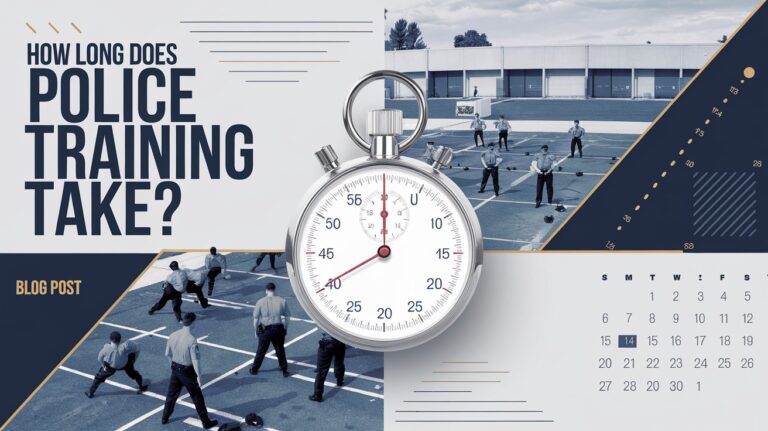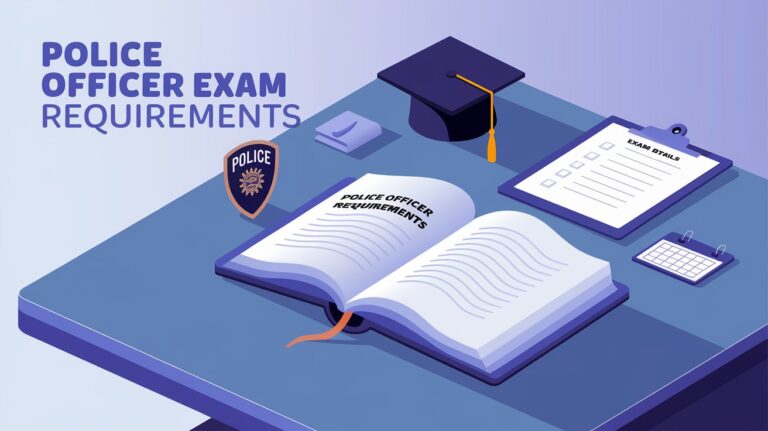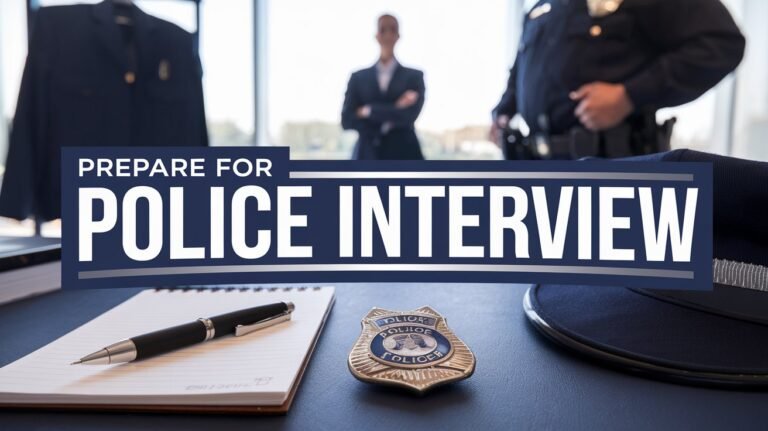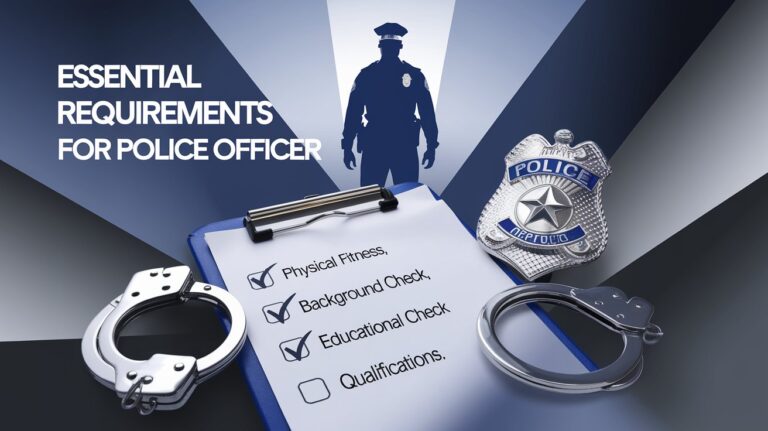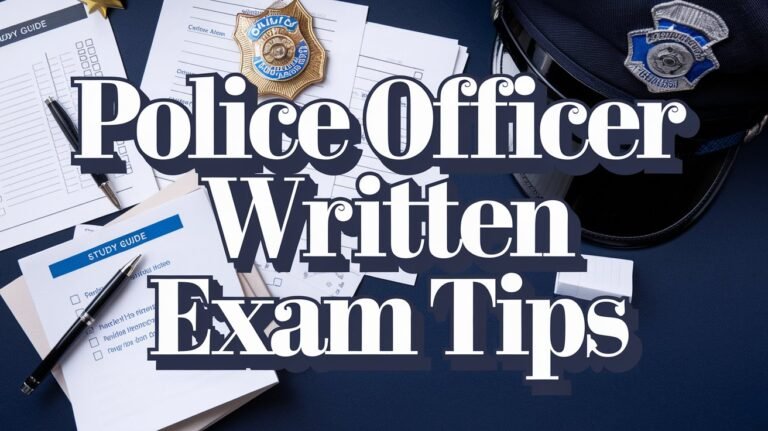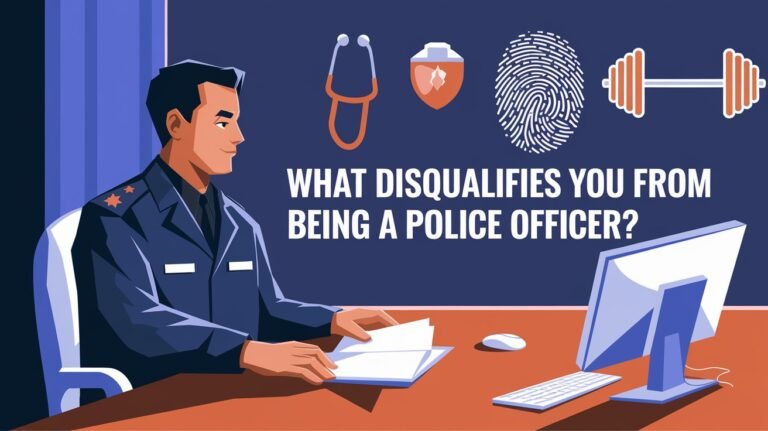Police Job Application Process: Requirements, Steps & Timeline

Starting a career in law enforcement is both exciting and rewarding. Yet, the application process can be detailed. Candidates need to be U.S. citizens, between 21-37 years old, and have a valid driver’s license. The steps include written exams, physical tests, background checks, and interviews.
Agencies look for people with integrity, intelligence, and a drive to make a difference. To apply, research the needs and steps of the agencies you’re interested in. Preparing well and knowing the evaluation process can help you succeed in this competitive field.
Basic Eligibility Requirements for Police Officers
To become a police officer, you must meet certain minimum qualifications. These requirements ensure candidates have the right skills, legal status, and physical abilities. Let’s look at what aspiring law enforcement professionals need to do.
Age and Citizenship Requirements
First, you must be a U.S. citizen to apply. Most police departments require this. You also need to be at least 21 years old. Many agencies have a maximum age limit of 37.
Education and License Prerequisites
You need a high school diploma or GED to apply. Some departments might want or need a college degree. Having a valid driver’s license is also essential, as you’ll need to drive police vehicles.
Physical Fitness Standards
- Height and weight proportional to overall body size
- Visual acuity of 20/100 or better, correctable to 20/20
- Normal color vision
- Ability to pass physical agility tests, such as a 1.5-mile run, body drag, fence/wall climb, push-ups, and sit-ups
These physical standards check if you can handle the job’s demands. Tests like running, climbing, and doing push-ups help find the right fit.
| Requirement | Details |
|---|---|
| Citizenship | Applicants must be U.S. citizens |
| Age | Minimum of 21 years, with an upper age limit around 37 |
| Education | High school diploma or GED, some agencies prefer college experience |
| Driver’s License | Valid driver’s license required |
| Physical Fitness | Height and weight proportional, 20/20 vision, normal color vision, ability to pass physical agility tests |
Meeting these requirements shows you’re ready to serve your community. It proves your commitment and qualifications.
Common Disqualifiers in Law Enforcement Applications
Police departments have strict rules for who can apply. Some background issues can stop you from joining. Felony convictions are a big no-no. Serious misdemeanors like theft or assault can also keep you out.
Drug abuse is a big worry for police. If you’ve used drugs before or test positive now, you’re likely out. Bad credit and domestic violence records are also big no-gos.
- Felony convictions
- Serious misdemeanors (e.g., theft, assault)
- Current or past drug abuse
- Bad credit history
- Domestic violence incidents
Even small problems can hurt your chances. Too many traffic tickets or visible tattoos can be a problem. Being honest is key. If you lie or hide info, you’re out.
| Disqualifier | Explanation |
|---|---|
| Felony convictions | Felony convictions are an absolute bar to employment as a police officer in most jurisdictions. |
| Serious misdemeanors | Misdemeanors involving theft, assault, or other serious offenses can also lead to disqualification. |
| Drug abuse | Current or past drug abuse, including positive drug tests during the application process, are common disqualifiers. |
| Bad credit history | Poor credit history is considered a red flag in police background investigations. |
| Domestic violence | A history of domestic violence incidents can be a disqualifier for prospective law enforcement officers. |
Essential Documents for Your Application Package
When you apply for a law enforcement job, you need a complete application package. This package includes key documents that show your skills and background. You’ll need to fill out police application forms, write a personal history statement, create a resume, and write a cover letter.
Required Forms and Paperwork
First, fill out all the forms given by the law enforcement agency. These forms ask for your personal info, education, work history, and any special licenses. Make sure to fill everything out correctly to avoid any problems.
Personal History Statement Guidelines
The personal history statement goes into more detail about you. It should cover your education, work, where you’ve lived, who you know, and any dealings with the law. Always tell the truth in this document. Any lies or missing info could get your application thrown out.
Resume and Cover Letter Specifications
Your resume should focus on your skills, experiences, and achievements that show you’re a good fit for the job. Emphasize your problem-solving, communication skills, and any special training. Then, write a cover letter that explains why you want to work in law enforcement.
Remember, your application package is your chance to impress the hiring team. By putting together a detailed and strong set of documents, you can show you’re serious and qualified for the police application documents, personal history statement, and law enforcement resume.
Police Job Application Process
The law enforcement hiring process is detailed. It aims to find the best candidates for police jobs. This involves various tests and checks to make sure applicants are up to the task.
The application process for police jobs includes several important steps:
- Submitting the application
- Written examination
- Oral board interview
- Physical agility test
- Background investigation
- Polygraph test
- Medical and psychological evaluations
- Final interview with the police chief
Some agencies might add extra steps, like a pre-polygraph test or a ride-along. The whole law enforcement hiring process can take months. Each step is carefully checked to make sure candidates are right for the job.
Applicants need to be ready to share lots of personal info. This includes their credit, criminal, and driving history. A background check will also look at their work history, references, and education. Scoring well on these tests shows they’re ready for the job.
The police recruitment steps are tough. This shows how important it is to prepare well and pay attention to detail. Those who make it through will have the skills and character to serve their communities well.
Written Examination Components
The written exam is key in the police hiring process. It checks if candidates have the basic skills needed for law enforcement. The test can have different parts, like reading, writing, solving problems, and making judgments.
Test Format and Structure
Police departments use various tests, like the POST Entry-Level Law Enforcement Test Battery (PELLETB) or the National Testing Network (NTN) exam. The PELLETB takes 2.5 hours and tests spelling, vocabulary, and reading skills. The NTN exam also lasts 2.5 hours and covers human relations, reading, and writing.
Study Resources and Preparation Tips
Future police officers need to prepare well for the written exam. Useful resources include practice tests and study guides. These help candidates get used to the test and its questions. Regular practice is key to improve communication and critical thinking skills.
Scoring System Overview
The scoring for the written exam can be pass/fail or a numerical score. Those who pass move on to the next steps, like physical tests, interviews, and background checks.
| Exam | Duration | Sections |
|---|---|---|
| PELLETB | 2.5 hours | Spelling, Vocabulary, Clarity, Reading Comprehension |
| NTN | 2.5 hours | Human Relations, Reading, Incident Observation and Report Writing |
Physical Agility Testing Requirements
Aspiring police officers must show their physical fitness and job skills through tough agility tests. These tests are key in the hiring process. They make sure candidates meet the police fitness test and law enforcement physical standards.
The physical agility test includes several parts:
- 1.5-mile run
- 165-pound body drag
- 6-foot chain link fence climb
- 6-foot solid wall climb
- Maximum push-ups in two minutes
- Maximum sit-ups in two minutes
Departments set specific times or counts for each task. Candidates must meet or beat these standards. Staying fit is key for applicants to pass these tests and move forward in the hiring process.
| Physical Fitness Requirement | Male (20-29 years old) | Female (20-29 years old) |
|---|---|---|
| Sit-ups (1 minute) | Entry: 32 / Graduation: 35 | Entry: 23 / Graduation: 30 |
| 300-meter run | Entry: 69 sec / Graduation: 62.1 sec | Entry: 88 sec / Graduation: 75 sec |
| Push-ups | Entry: 19 / Graduation: 26 | Entry: 9 / Graduation: 13 |
| 1.5-mile run | Entry: 14:34 / Graduation: 13:15 | Entry: 17:49 / Graduation: 15:46 |
Applicants get at least five minutes to rest between tests. Passing the physical agility test is a big step in becoming a police officer.
Oral Board Interview Structure
The police oral board interview is a key part of becoming a police officer. It’s a structured interview with a panel of 3 to 5 members. These members are usually current police staff, supervisors, and sometimes community leaders.
The interview lasts from 30 to 50 minutes. During this time, candidates answer 6-8 questions. These questions cover their background, how they handle tough situations, problem-solving, and ethical dilemmas.
Interview Question Categories
Candidates are judged on their communication, judgment, and if they fit the department’s values. The panel tries to make the interview challenging to see how candidates handle stress. Each panel member scores candidates from 1 to 9.
Those with scores between 90 and 100 have a good chance of being hired.
Professional Presentation Tips
- Prepare an opening statement to introduce yourself and make a good first impression.
- Avoid giving overly detailed or negative responses to the interview questions.
- Explain your genuine reasons for choosing a career in law enforcement and why you want to work for that specific agency.
- Present actual weaknesses, rather than giving a “cop-out” answer.
- Focus on forming a closing statement that summarizes your strengths.
Following these tips and preparing well, candidates can show they’re right for the job. This increases their chances of success in the police oral board interview.
Background Investigation Process
To become a police officer, a thorough background check is needed. This check looks into the candidate’s past and work history. It makes sure the information matches what they said in their application. This process usually takes 4-8 weeks and might include a polygraph test.
Candidates must be honest during the police background check and law enforcement vetting process. If they hide or lie about important details, they can be disqualified right away. Investigators check the candidate’s work history, criminal records, and personal references very carefully.
| Reason for Rejection | Explanation |
|---|---|
| Deliberate Withholding or Misrepresentation | The number one reason individuals fail background investigations is due to deliberately withholding or misrepresenting job-relevant information. |
| Automatic Basis for Rejection | There are very few automatic bases for rejection, indicating that issues like prior misconduct (e.g., illegal drug use, driving under the influence, theft, arrests, or convictions) are typically not automatically disqualifying. |
| Polygraph or Voice Stress Analysis | As part of the background investigation process, applicants may be subjected to a detection of deception examination, such as a polygraph or voice stress analysis, to verify the truthfulness of the information provided. |
The background investigation process is very detailed and time-consuming. It involves gathering many documents and talking to family, friends, and employers. Candidates need to show proof of age, education, and citizenship.
The rules for background checks are in Commission Regulation 1953 (PDF). This document helps applicants understand what to expect in the law enforcement vetting process.
Medical and Psychological Evaluations
Applicants for police jobs must go through detailed medical and psychological checks. These tests are key to see if someone is fit for the tough job of a police officer. They help figure out if a person can handle the stress and demands of police work.
Health Assessment Standards
The medical check looks at the candidate’s physical health and fitness. It includes tests for vision, hearing, and heart health. It also checks the applicant’s overall physical condition.
The aim is to find out if any health issues could stop the person from doing the job well.
Mental Fitness Requirements
The psychological test looks at the candidate’s mental health and if they’re right for police work. It uses tests and interviews to see how they handle stress and make decisions. It also checks if they fit well with the job’s demands.
After these tests, the candidate is rated as low-risk, medium-risk, or high-risk. This rating helps the police department decide if they’re a good fit.

